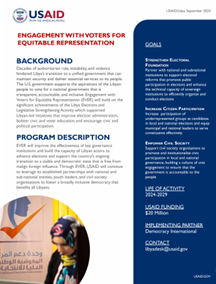2024-2029 • $20 million • Implemented by Democracy International
Overview
Decades of authoritarian rule, instability, and violence hindered Libya’s transition to a unified government that can maintain security and deliver essential services to its people. The U.S. government supports the aspirations of the Libyan people to vote for a national government that is transparent, accountable, and inclusive. Engagement with Voters for Equitable Representation (EVER) will build on the significant achievements of the Libya Elections and Legislative Strengthening Activity which supported Libyan-led initiatives that improve election administration, bolster civic and voter education, and encourage civic and political participation. EVER will improve the effectiveness of key governance institutions and build the capacity of Libyan actors to advance elections and support the country’s ongoing transition to a stable and democratic state that is free from malign foreign influence. Through EVER, USAID will continue to leverage its established partnerships with national and sub-national entities, youth leaders, and civil society organizations to foster a broadly inclusive democracy that benefits all Libyans.
Goals
STRENGTHEN ELECTORAL FOUNDATION
USAID will partner with national and subnational institutions to support electoral reforms that promote public participation in elections and enhance the technical capacity of sovereign institutions to efficiently organize and conduct elections.
INCREASE CITIZEN PARTICIPATION
USAID will increase participation of underrepresented groups as candidates in local and national elections and equip municipal and national leaders to serve constituents effectively.
EMPOWER CIVIL SOCIETY
USAID will support civil society organizations to promote and institutionalize civic participation in local and national governance, building a culture of civic engagement to ensure that the government is accountable to the people.
ANTICIPATED RESULTS
- Build the capacity of the High National Election Commission (HNEC) to strategically plan and conduct transparent and inclusive local and national elections through systems development, improved communications, and staff training
- Support the HNEC to improve internal and external communications, resulting in increased demand for and participation in local and national elections
- Facilitate collaboration between HNEC, civil society organizations (CSO), local stakeholders, and independent institutions (such as the judiciary) to advocate for reforms and address constituents' rights and needs
- Increase capacity for electoral dispute resolution mechanisms and institutions to improve electoral transparency and pave the way for peaceful democratic transitions
- Provide capacity building, knowledge sharing and small grants to networks for independent candidates and newly elected officials from underrepresented communities including women, minorities, youth, and people with disabilities
- Equip civic activists and emerging political leaders with data for informed decision-making through polling, focus groups, and analysis
- Provide grants to CSOs to improve civic participation in the political process


